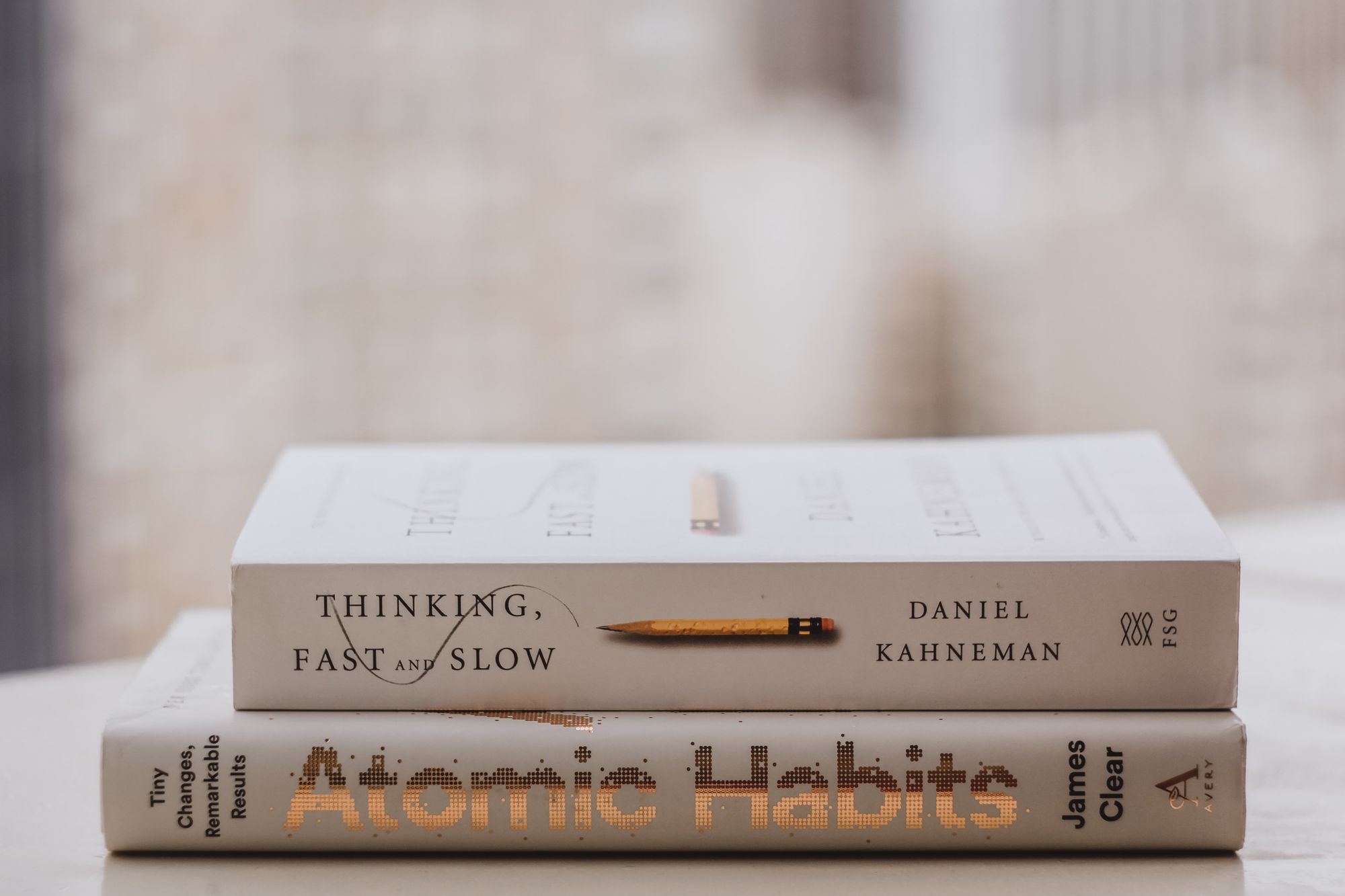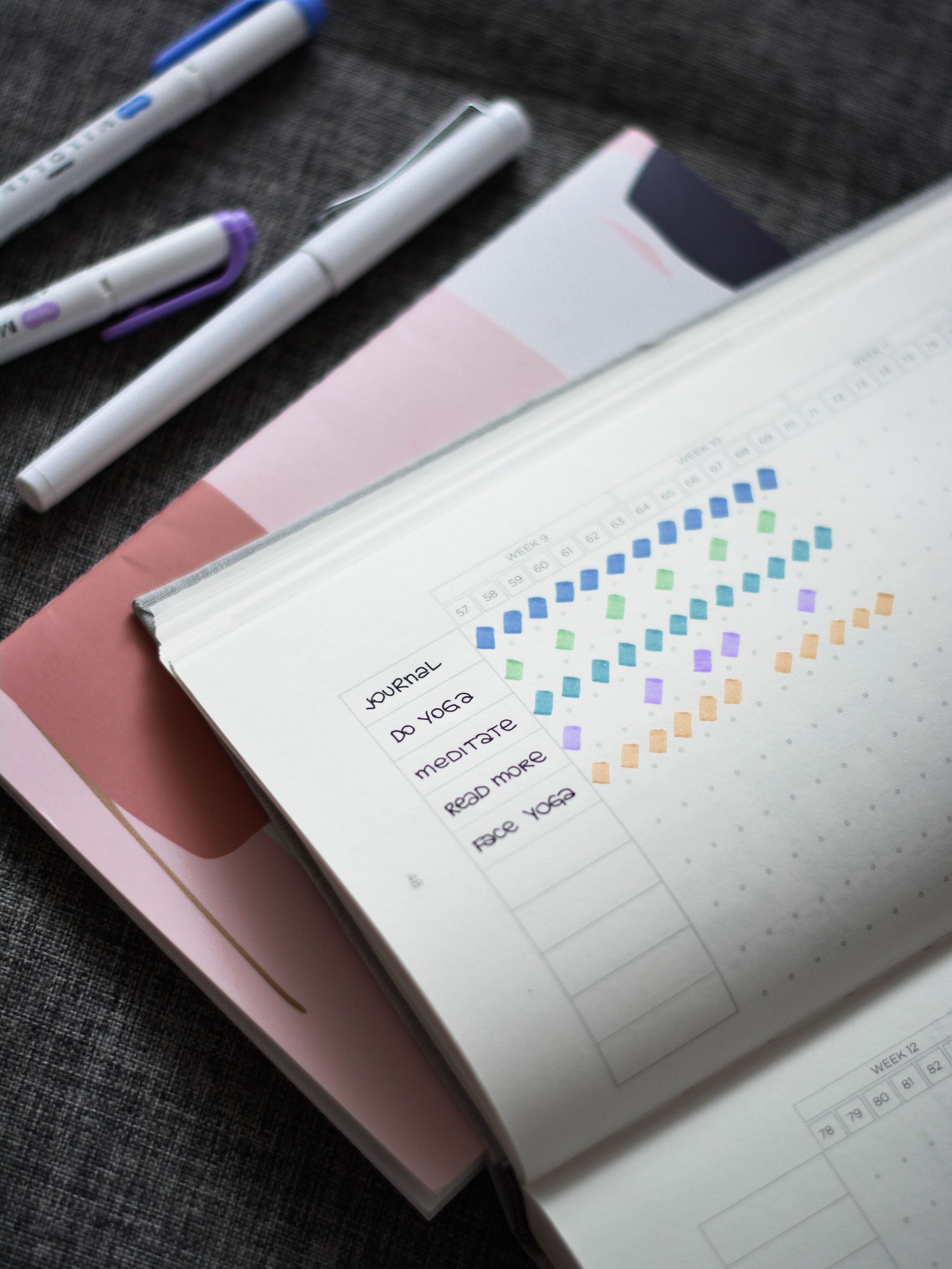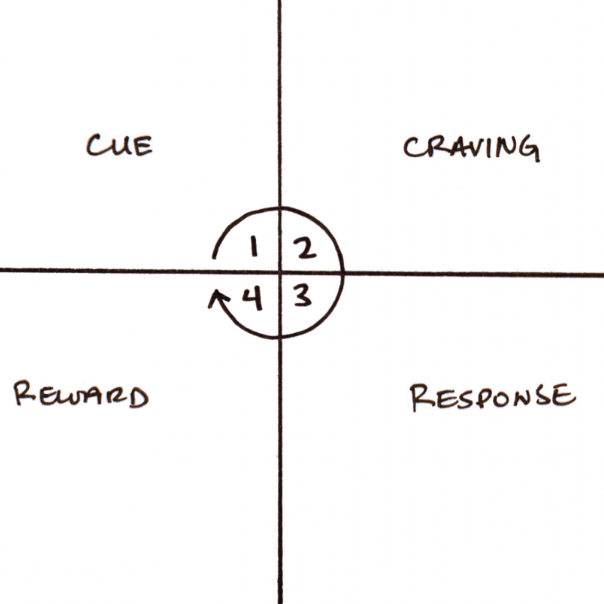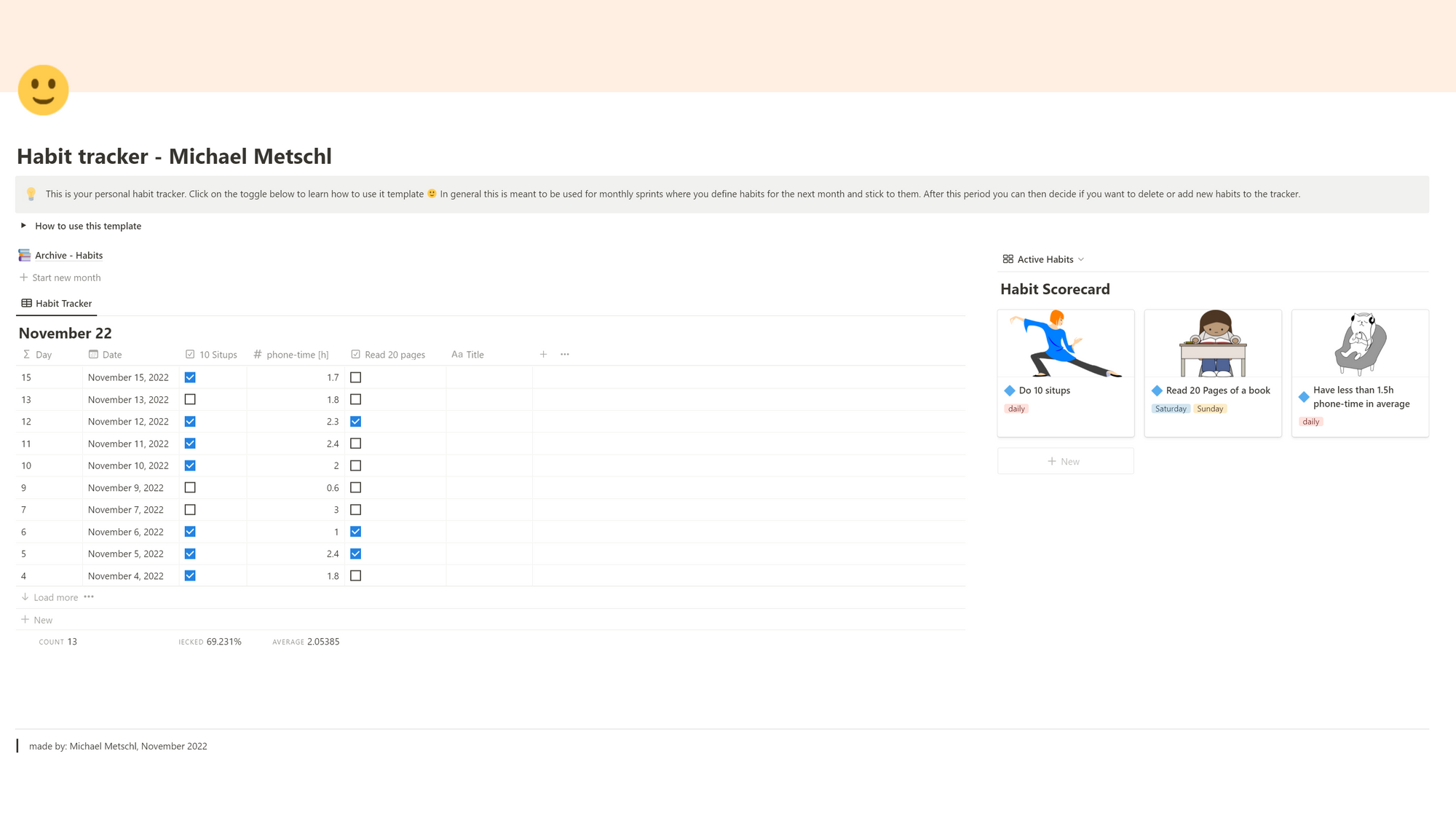Habits & Systems: Supercharge efficiency

”Replacing just a few key negative habits with a few positive habits can easily be the difference between being mostly unhappy and being happy almost all of the time.” Tynan
If you read my previous post, you now have a highly effective tool to get to know yourself better and periodically evaluate the state of your life. The difficulty of this tool, namely reviews, is that you have to consistently use them in order to make a significant difference. If you do journaling just once or for a short period of time it won’t reveal its true power. That’s why it is important to know how to form good habits and systems which help you consistently do things over a longer period of time. It will increase the default speed you are progressing & developing without more effort.

Habits explained
The youtube-channel “Kurzgesagt - in a nutshell” explains it quite nicely. Think of your mind as a jungle. Due to the abundance of plants and fauna there, getting around is rather difficult. As you move through the jungle you leave paths which makes it easier for you to walk there the next time. As you repeat this path over and over it starts to become a paved road which is easy to walk on. Similarly doing something over and over slowly forms habits which will start becoming a normal part of your day and are easy to execute.
How to develop good habits
You might have tried to form a habit already like “doing sports” or “reading more”. Many people fail in the first weeks because it’s hard to keep it up while life hits. You start making exceptions and sooner or later quit your past ambitions. This is a very normal human behaviour but there are ways to help you establish new habits.
How habits work: The habit loop
You must first understand how habits typically work. There are four stages that a habit usually goes through.

🎚️ Cue
That’s the trigger that starts the habit. Most of the time it is an input from your environment. Habit cues are often produced by emotions, people, things, time and places. Since this is the entry point of any bad or good habit it’s important to pay attention to your cues.
- Example: Your phone rings
🧲 Craving
Usually a cue creates an urge to resolve something. Cravings are the motivational force behind every habit and are the reason why you want to act in the first place. It is important to understand, that you don’t crave the habit itself but the change of a state it delivers. You do not crave checking your phone but the dopamine shots it might hold in stock. Because of this, it's crucial to always listen carefully and be sincere with yourself.
- Example: You want to know why your phone rang
🏃🏼♀️ Response
That is the concrete action you do. In this sense, an action could be something you physically do or an idea you have.
- Example: You unlock your phone and an instagram notification appears
🎁 Reward
That’s the feeling you have when satisfying cravings.
- Example: The story you posted just got liked 10 times. You feel happy because other people are paying attention to you
Sidenote from my research: You might find “craving” & “response” summed up as routine, as well as “reward” rephrased as “harmony”
If any of this stages are insufficiently run through, it will most likely not become a habit. I for example struggle with leaving bed early at weekends. If I don’t have a reason to stand up early I stay in bed until 11am because the craving to stand up is not strong enough. That is something I could possibly change with a morning routine, which is basically a habit with the trigger “waking up”. Similarly if you think an action is not worth it, the reward might not strong enough.
That’s why it is important to know how to influence those stages. Here are my tips on how to make a behavioural change.
How to establish habits
The four rules of behavioral change, which are derived from the habit loop, are your major tool for change. The book “Atomic Habits”* provides a detailed explanation of this. Those rules are:
🚨 Make it obvious
Have a good trigger so you know when to do something.
- Make a habit scorecard. Finding a good cue for a certain behaviour is the first step towards establishing it. In a habit scorecard you can write down the habits you want to establish with the corresponding cues. I find it useful to sort them by stages which are: Those habits you are trying to implement at the moment, habits you want to implement in the future and those you stopped doing. That way you are aware of your behaviours, which intrestingly also makes the habit of “behavioural change” itself more obvious aswell. I made a tracker in Notion which includes a habit card, link below.
- Manipulate your environment to your advantage. Try to make cues for habits you want to establish obvious in you environment. If you want to play guitar more often make it easy accessable, f.i. put it on your sofa.
❤️ Make it attraktive
Have a strong craving for the behaviour.
- Discover your underlining motives. As mentioned above it can be quite tricky to realize why you are doing things, because it often lies hidden behind more obvious behaviours. Here is a short example to clarify. Action: Posting pictures about your vacation online. Some might say they just want to dump their fotos onto a plattform. The underlying motive might be keeping up with their friends who also post their life-highlights. Since thoughts are a complicated thing you can also go deeper and ask why you want to keep up with your friends. The second basement of your thoughts might be that you don’t want to be excluded from the group. The third basement could then be fear of being alone. Asking “why” is a powerful tool. Even more so if you ask multiple times. Truly knowing why you do something helps you change it.
- The “Premacks principle” states, that a less desired behaviour can be made more attractive by reinforcing it with something you like doing. If you are struggling with working out, you could combine it with listening to you favourite podcast or watching a series.
- Spend time with people who share the same tendency as you. F.i. get a sparring partner through networking at a gym to make a habit long lasting.
🟢 Make it easy
Make the response as easy to execute as possible.
- Reduce the friction to start doing something as much as possible. Eating one apple a day might be difficult if you need to go to the store everytime you want to eat one. Always have apples at home to reduce the friction.
- Implement systems that make the process of doing something easier (more on that below).
🎆 Make it satisfying
Make the reward worth the action to reinforce the habit.
- You need a feeling of progress and success to reinforce a certain behaviour. Implement a reward system like a habit tracker so you can tick of the habits you succeeded doing that day. Keep in mind that ticking of a habit tracker is a habit itself so make it obvious, attraktive, easy and satisfying as well. (I know, it’s complicated 😀) Have your habit tracker somewhere easy accessable (obvious), choose a nice design that suits you (attraktive/satisfying) and is easy to work with (easy).
- Reward yourself for a behaviour you would like to reinforce. You could f.i reward yourself for a 1 week streak of doing 10 push-ups each day. The reward should not be something contrary to the habit itself. Allowing yourself to eat unhealthy for the rest of the day, because you did 10 push-ups might not lead to success as intended.

How to get rid of bad habits
Mostly do the opposite of what is written in the 4 laws of behaviour change abhove. The one thing you should still do is make it obvious but in another sense. It is important to know the behaviours you want to change so write down bad habits in your scorecard aswell. As with good habits it is important to know what your underlying motives are. So ask “why do I do this” multiple times until you found out why you have this behaviour.
👻 Make it invisible
- Remove the cue from your environment. Try to free yourself from bad influences in your environment. Hide your sweets in a cabinet instead of presenting it on the living room table. That way you won’t be tempted to eat as much.
💩 Make it unattractive
- Link a bad habit with something unsatisfying. A friend of mine stopped smoking cigarettes by smelling at an old ashtray each time he felt the urge to smoke.
🔴 Make it difficult
- Maximize the friction to start doing something. Don’t buy cigarettes at the store so each time you want to smoke you have to go buy some. You could also restrict yourself from using the car for buying cigarettes
😢 Make it unsatisfying
- Get an accountability partner. Pay someone each time you fall back into a bad habit. I for example pay 10€ to my girlfriend each time I stand up after 7am on workdays.
Tips for increased chance of success
- The 2 minute rule
If something takes just 2 minutes to do, do it right away. Most of the time you will have enough time to execute the thing you just thought about. Need to empty the dishwasher? Do it now! - Habit stacking
You can form habit chains, where the end of one habit marks the cue for another habit. That way you increase the chance of doing something. This habit chain could look something like this: Wake up → make bed → brush teeth → do 10 push-ups → shower → write down one thing you want to do today - Don’t make exceptions
Making exceptions dramatically increases your chance of failure. Always try to find space in your day for habits you want to implement. - Take it slow
Habits usually need 15 - 250 days to start automate. Trying to change one habit at a time can be quite challenging on it’s own so be patient. Don’t try to get rid of 2 bad habits while establishing 3 good habits simultaneously.
Systems
"You do not rise to the level of your goals. You fall to the level of your systems." - James Clear
Just like habits, systems are an important framework for achieving goals. If you want to accomplish something in the future you need a system that guides the way and keeps you on track. Good systems can aid you with reaching your goals as well as establishing habits. Overall systems enable you to achieve something quicker, easier and with less error rate. My opinion on systems is somewhat abstract. A system can be:
- a tool that aids you with doing or to remember something
- an environment that helps you with habits
- a template or algorithm that tells you what to do
The core idea is that you think about how a tool, your environment or even another person can assist you with achieving something.
That way you need less brainpower for things you regularly want to do so you can focus on the bigger picture because you don’t need all your attention for daily tasks. Just like a vending machine: You press a button and you get what you want without the need to remember every little step that has to be done to receive the candy.
How to establish good systems
The main thing is that you think about how to do something efficiently. There are 4 aspects that I think a system can help you with:
❗ It reminds you of something
This can be a one time task or a trigger to a cue for a habit you want to establish. The tool most people are familiar with is an alarm. This is a system you established so you don’t oversleep. Another example is a calender for appointments. It reminds you to do something or go somewhere so you don’t have to memorize everything by yourself.
👍🏿 It makes something easier
As mentioned in the habits section you can build a system into your environment that assist you reinforce good behaviour. F.i. having a yoga mat always lying on the floor of your living room to increase the chance of doing sport. It’s the “reducing friction” part of habits.
⏩ It makes something quicker
If you are calculating your spendings every month because you want to keep an eye on your money think about how to improve the system. You could download an app for that case or program an excel sheet that calculates your spendings automatically.
⚠️ It makes something more error-free
You could double check everything you’re doing to decrease the error-rate of your tasks. But that would cost huge amounts of brainpower which would not be sustainable. That’s where templates can come in handy. E.g. a packing list for your yearly summer vacation. That way you don’t forget your toothbrush anymore with even less effort.

If you want a system that helps you write down and successfully implement habits into your life try out my new habit tracker for Notion! “Habit Tracker Notion - Michael Metschl” is now available on Gumroad. Just click on the button below and download the template for free.
I publish posts for this productivity series every two weeks so if you want to stay posted on my releases subscribe to my E-Mail Newsletter and follow me on social media!
What helps you establish habits into your life? Do you use a tracker or have you implemented other systems to help you with that?
Tell me your thoughts here:
Instagram | Twitter | Pinterest | Linkedin | E-Mail newsletter
Conclusion
Why habits are usefull:
- They help you reach long term goals by slowly implementing wanted behaviour into your life.
How habits work:
- Habits are behaviour algorithms that automatically run when triggered according to the habit loop: 🎚️ Cue → 🧲 craving → 🏃🏼♀️ response → 🎁 reward
Use the 4 laws of behavior change to adjust your habits:
- Make it 🚨 obvious, ❤️ attraktive, 🟢 easy & 🎆 rewarding to establish good habits
- Make it 👻 invisible , 💩 unattractive, 🪜 difficult, 😢 unsatisifying to stop bad habits
Establish good systems to additionally help you with reaching your goals:
- Systems can be anything from tools, environments to people that assist you
- A system either ❗ reminds you, makes something 👍🏿 easier, ⏩ quicker or more ⚠️ error-free
Next time: “Taskmanagement: Stay on top of your world”
Forming habits is a key aspect of a self-determined life. But what about unregular things like projects or daily stuff that needs to be done? Learn how to handle tasks without getting stressed from them.
“You don’t have to hit a home run every single day—you simply have to get in the game.” - Tommy Baker
More about habits & systems
- What is the habit loop - Dr. Jud
- IDC theory: habit and the habit loop
- Change Your Life - One Tiny Step at a Time - Kurzgesagt
- The 5 Triggers That Make New Habits Stick - James Clear

